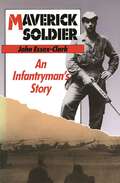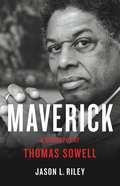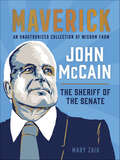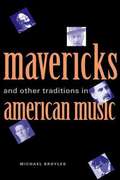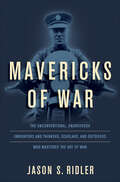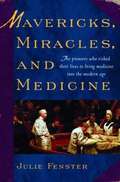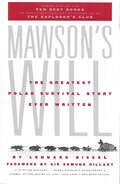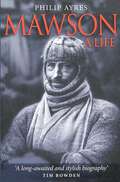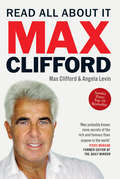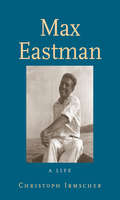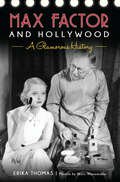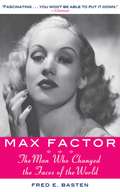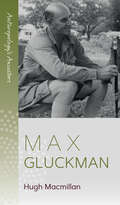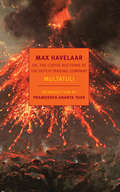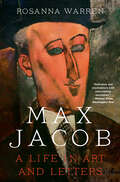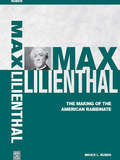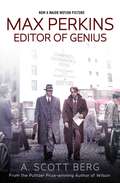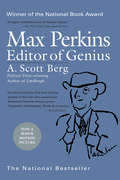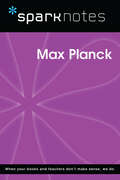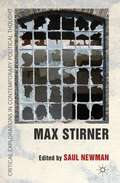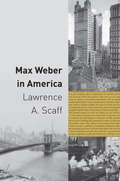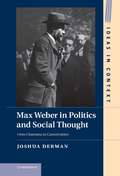- Table View
- List View
Maverick Soldier: An Infantryman's Story
by John Essex-ClarkMaverick Soldier is the forthright, nuts-and-bolts account of John Essex-Clark's unmatched experience as a warrior, leader and teacher. Its telling is all of a piece with the man himself—bluff, astute, no-nonsense. In the course of stumbling, as he puts it, from the rank of private to brigadier, Essex-Clark has fought in wars with the Australian, British, United States and Rhodesian armies, and has led in battle Malay, South African, Rhodesian, Vietnamese, British, New Zealand, United States and Australian soldiers. In peacetime came tours of duty in North America and Western Europe. Nicknamed 'Digger' by the Rhodesian Army and 'The Big E' in the Australian, he led by force of personality, drive, common sense and self-confidence. Military readers and armchair witnesses to war will be challenged by his trenchant and timely views on army obsession with technology and the paucity of subtle tactical thinking. Various controversies are aired: whether we were 'pussyfooters' in Vietnam; bastardization at Duntroon; how best to conduct counter-terrorism. He is angered by what he sees as a 'surfeit of military dilettantes and budding bureaucrats and a dearth of warrior-chiefs'. Always one to lead from the front and to trust the courage and good sense of the ordinary infantryman, his interests have been strategy and battle tactics, leadership and training. He writes particularly for today's young soldier whom he loves with an old fashioned generosity, and to whom he can declare with conviction, 'I have no angst about being a soldier'.
Maverick: A Biography of Thomas Sowell
by Jason L RileyA biography of Thomas Sowell, one of America's most influential conservative thinkers.Thomas Sowell is one of the great social theorists of our age. In a career spanning more than a half century, he has written over thirty books, covering topics from economic history and social inequality to political theory, race, and culture. His bold and unsentimental assaults on liberal orthodoxy have endeared him to many readers but have also enraged fellow intellectuals, the civil-rights establishment, and much of the mainstream media. The result has been a lack of acknowledgment of his scholarship among critics who prioritize political correctness.In the first-ever biography of Sowell, Jason L. Riley gives this iconic thinker his due and responds to the detractors. Maverick showcases Sowell's most significant writings and traces the life events that shaped his ideas and resulted in a Black orphan from the Jim Crow South becoming one of our foremost public intellectuals.
Maverick: An Unauthorized Collection of Wisdom from John McCain, the Sheriff of the Senate
by Mary ZaiaA lifetime of wisdom from a true American patriotThe country is more polarized than it has been for decades, but John McCain is the rare public figure who has earned the respect of colleagues and constituents on both sides of the aisle. A model for bipartisanship and political integrity, in his forty years in politics McCain has never been afraid to buck trends or ruffle a few feathers. His words are more important today than ever.Sample quotes:“In prison, I fell in love with my country.”“Nothing in life is more liberating than to fight for a cause larger than yourself, something that encompasses you but is not defined by your existence alone.”“Americans never quit. We never surrender. We never hide from history. We make history.”“It is your character, and your character alone, that will make your life happy or unhappy.”
Maverick: the Personal War of a Vietnam Cobra Pilot
by Dennis J. Marvicsin Jerold A. GreenfieldMemoir of a Vietnam combatant.
Mavericks and Other Traditions in American Music
by Michael BroylesFrom colonial times to the present, American composers have lived on the fringes of society and defined themselves in large part as outsiders. In this stimulating book Michael Broyles considers the tradition of maverick composers and explores what these mavericks reveal about American attitudes toward the arts and about American society itself. Broyles starts by examining the careers of three notably unconventional composers: William Billings in the eighteenth century, Anthony Philip Heinrich in the nineteenth, and Charles Ives in the twentieth. All three had unusual lives, wrote music that many considered incomprehensible, and are now recognized as key figures in the development of American music. Broyles goes on to investigate the proliferation of eccentric individualism in all types of American music--classical, popular, and jazz--and how it has come to dominate the image of diverse creative artists from John Cage to Frank Zappa. The history of the maverick tradition, Broyles shows, has much to tell us about the role of music in American culture and the tension between individualism and community in the American consciousness.
Mavericks of War: The Unconventional, Unorthodox Innovators and Thinkers, Scholars, and Outsiders Who Mastered the Art of War
by Jason S RidlerA military historian sheds light on the maverick thinkers who hatched outlandish plots and shaped warfare from WWI to Vietnam and beyond. During World War I, Oxford-trained archeologist Lawrence of Arabia used his knowledge of the Middle East to help organize the Arab revolt against the Ottoman Empire. In this entertaining and insightful book, Jason Ridler profiles the intellectuals, outsiders, and eccentrics who followed in Lawrence&’s footsteps across the next hundred years of warfare—those who relied on creativity, curiosity, and outside-the-box thinking to shape battlefields from World War II and Vietnam to Iraq and Afghanistan. These men were Ivy Leaguers and Oxford scholars, anthropologists and archeologists. Among them were an ad executive, an international activist, a Peace Corps veteran, an émigré journalist (and former teenage member of the French Resistance), and a diplomat. These mavericks and oddballs—both men and women—were not always heralded or heeded, and sometimes they were hated. But they each challenged traditional military thought and helped win wars, secure peace, and change the face of modern military conflict.
Mavericks of the Sky: the First Daring Pilots of the U.S. Air Mail
by Barry Rosenberg Catherine MacaulayHistory of the introduction of the air mail service, and biographies of the first pilots.
Mavericks, Miracles, and Medicine: The Pioneers Who Risked Their Lives to Bring Medicine into the Modern Age
by Julie M. FensterMavericks, Miracles, and Medicine brings to life stories of the pioneering geniuses, eccentrics, and freethinkers who moved beyond the conventions of their day at great personal risk and often with tragic results to push forward the boundaries of modern medicine.
Mawson's Will: The Greatest Survival Story Ever Written
by Sir Edmund Hillary Lennard BickelMAWSON'S WILL is the dramatic story of what Sir Edmund Hillary calls "the most outstanding solo journey ever recorded in Antarctic history." For weeks in Antarctica, Douglas Mawson faced some of the most daunting conditions ever known to man: blistering wind, snow, and cold; loss of his companion, his dogs and supplies, the skin on his hands and the soles of his feet; thirst, starvation, disease, snowblindness - and he survived. Sir Douglas Mawson is remembered as the young Australian who would not go to the South Pole with Robert Scott in 1911, choosing instead to lead his own expedition on the less glamorous mission of charting nearly 1,500 miles of Antarctic coastline and claiming its resources for the British Crown. His party of three set out through the mountains across glaciers in 60-mile-per-hour winds. Six weeks and 320 miles out, one man fell into a crevasse, along with the tent, most of the equipment, all of the dogs' food, and all except a week's supply of the men's provisions.Mawson's Will is the unforgettable story of one man's ingenious practicality and unbreakable spirit and how he continued his meticulous scientific observations even in the face of death. When the expedition was over, Mawson had added more territory to the Antarctic map than anyone else of his time. Thanks to Bickel's moving account, Mawson can be remembered for the vision and dedication that make him one of the world's great explorers."A riveting account . . . makes Mawson's achievement a symbol of the desire to live." -- The New York Times Book Review"A powerful reading experience." -- Publishers WeeklyFrom the Trade Paperback edition.
Mawson: A Life
by Philip AyresSir Douglas Mawson was Australia's pre-eminent Antarctic explorer, a tall, quiet scientist who survived several gruelling polar expeditions, and went on to play a notable role in the academic and research establishment.He is most famed for an ill-fated expedition in 1913, in which he trekked hundreds of kilometres alone, without supplies, after his two companions perished. But he was also the main architect of Australia's official Antarctic presence in the first half of the twentieth century, instrumental in the Australian Government's decision to claim part of Antarctica, and in the founding of Australia's major organization for Antarctic exploration and research.Philip Ayres' life of Mawson is the definitive biography of the polar explorer, who died in 1958. In this richly researched and well-illustrated work, he paints a picture of a man who was a brave and resourceful hero, but also a deeply flawed personality.
Max Clifford: Read All About It
by Angela Levin Max Clifford'Max knows more secrets of the rich and famous than anyone in the world'Piers MorganMax Clifford is the media guru everyone calls when they want to know about a celebrity story or a celebrity's relationship with the media. Starting out as a junior member of the press department at EMI, he has become one of the most influential figures in today's society, and a household name. What is less known is the other side to Max: the stories he keeps out of the papers; his stand against corruption; his mischievous sense of humour; his dedication to helping people from all walks of life;his love for his wife of nearly forty years who tragically died of cancer; and his devotion to his daughter Louise who, at six,was diagnosed with juvenile rheumatoid arthritis and is permanently disabled. The essential memoir for those interested in both PR and celebrity.
Max Eastman: A Life
by Christoph IrmscherThe definitive biography of a radical activist and intellectual Max Eastman (1883–1969) was a prolific writer, radical, and public intellectual who helped shape the twentieth century. While researching this masterful work, acclaimed biographer Christoph Irmscher was granted unprecedented access to the Eastman family archive, allowing him to document little-known aspects of the famously handsome and charismatic radical. Considered one of the “hottest radicals” of his time, Eastman edited two of the most important modernist magazines, The Masses and The Liberator, and campaigned for women’s suffrage and world peace. A fierce critic of Joseph Stalin, Eastman befriended and translated Leon Trotsky and remained unafraid to express unpopular views, drawing criticism from both conservatives and the Left. Set against the backdrop of several decades of political and ideological turmoil, and interweaving Eastman’s singular life with stories of the fascinating people he knew and loved, this book will have broad interdisciplinary appeal in twentieth-century history and politics, intellectual history, and literary studies.
Max Factor and Hollywood: A Glamorous History
by Erika ThomasThe story of the makeup artist who changed the film industry—and the world of modern cosmetics. Includes photos. When Polish wigmaker and cosmetician Max Factor arrived in Los Angeles at the dawn of the motion picture industry, &“make-up&” had been associated only with stage performers and ladies of the oldest profession. Appalled by the garish paints worn by actors, Factor introduced the first &“flexible&” greasepaint for film in 1914. With a few careful brush strokes, a lot of innovation, and the kind of luck that can happen only in Hollywood, Max Factor changed the meaning of glamour. His innovations can be experienced in every tube of lipstick, palette of eye shadow, and bottle of nail lacquer used today. Join author Erika Thomas as she reveals the makeup guru's expert beauty tips and the story of how he created the most iconic golden-era looks that are as relevant today as they were nearly a century ago.
Max Factor: The Man Who Changed the Faces of the World
by Fred E. BastenNice women never wore makeup. Even the word was taboo in polite society--until Max Factor entered the scene. Born in Poland in 1877, Factor worked as a beautician for the Russian royal family, the Romanovs. In 1904, he fled to America, where he opened a cosmetics store in Los Angeles. Creating makeup originally for silent films, then the talkies, and, ultimately, color motion pictures, Factor designed looks for Katharine Hepburn, Rita Hayworth, Bette Davis, and countless other beauties of the day. Soon women everywhere wanted to look like their favorite glamorous stars, and Factor was there to help, bringing his innovative cosmetics to the general public. He revolutionized the world of beauty by producing many firsts: false eyelashes, lip gloss, foundation, eye shadow, the eyebrow pencil, concealer, wand-applicator mascara, and water-resistant makeup. A true innovator, he also introduced the concept of color harmony and the celebrity-endorsed cosmetics advertising that forms the glamorous backbone of the modern industry. Max Factor was the father of modern makeup. This is his extraordinary story.
Max Gluckman (Anthropology's Ancestors #6)
by Hugh MacmillanThis handy, concise biography describes the life and intellectual contribution of Max Gluckman (1911-75) who was one the most significant social anthropologists of the twentieth century. Max Gluckman was the founder in the 1950s of the Manchester School of Social Anthropology. He did fieldwork among the Zulu of South Africa in the 1930s and the Lozi of Northern Rhodesia/Zambia in the 1940s. This book describes in detail his academic career and the lasting influence of his Analysis of A Social Situation in Modern Zululand (1940-42) and of his two large monographs on the legal system of the Lozi. From the Introduction: Max Gluckman was the most influential of a group of social anthropologists who emerged from South Africa during the 1930s into what was essentially a new academic discipline. His description and analysis of events in real time implied a rejection of contemporary social anthropological practice, of the ‘ethnographic present’, and of hypothetical or conjectural reconstructions and an acceptance of the need to study ‘primitive’ societies in the context of the modern world.
Max Havelaar: Or, the Coffee Auctions of The Dutch Trading Company (Library Of The Indies)
by MultatuliA fierce indictment of colonialism, Max Havelaar is a masterpiece of Dutch literature based on the author's own experience as an adminstrator in the Dutch East Indies in the 1850s.A brilliantly inventive fiction that is also a work of burning political outrage, Max Havelaar tells the story of a renegade Dutch colonial administrator’s ultimately unavailing struggle to end the exploitation of the Indonesian peasantry. Havelaar’s impassioned exposé is framed by the fatuous reflections of an Amsterdam coffee trader, Drystubble, into whose hands it has fallen. Thus a tale of the jungles and villages of Indonesia is interknit with one of the houses and warehouses of bourgeois Amsterdam where the tidy profits from faraway brutality not only accrue but are counted as a sign of God’s grace. Multatuli (meaning “I have suffered greatly”) was the pen name of Eduard Douwes Dekker, and his novel caused a political storm when it came out in Holland. Max Havelaar, however, is as notable for its art as it is for its politics. Layering not only different stories but different ways of writing—including plays, poems, lists, letters, and a wild accumulation of notes—to furious, hilarious, and disconcerting effect, this masterpiece of Dutch literature confronts the fixities of power with the protean and subversive energy of the imagination.
Max Horkheimer and the Foundations of the Frankfurt School
by John AbromeitThis book is the first comprehensive intellectual biography of Max Horkheimer during the early and middle phases of his life (1895-1941). Drawing on unexamined new sources, John Abromeit describes the critical details of Horkheimer's intellectual development. This study recovers and reconstructs the model of early Critical Theory that guided the work of the Institute for Social Research in the 1930s. Horkheimer is remembered primarily as the co-author of Dialectic of Enlightenment, which he wrote with Theodor W. Adorno in the early 1940s. But few people realize that Horkheimer and Adorno did not begin working together seriously until the late 1930s or that the model of Critical Theory developed by Horkheimer and Erich Fromm in the late 1920s and early 1930s differs in crucial ways from Dialectic of Enlightenment. Abromeit highlights the ways in which Horkheimer's early Critical Theory remains relevant to contemporary theoretical discussions in a wide variety of fields.
Max Jacob: A Life In Art And Letters
by Rosanna WarrenA comprehensive and moving biography of Max Jacob, a brilliant cubist poet who lived at the margins of fame. Though less of a household name than his contemporaries in early twentieth century Paris, Jewish homosexual poet Max Jacob was Pablo Picasso’s initiator into French culture, Guillaume Apollinaire’s guide out of the haze of symbolism, and Jean Cocteau’s loyal friend. As Picasso reinvented painting, Jacob helped to reinvent poetry with compressed, hard-edged prose poems and synapse-skipping verse lyrics, the product of a complex amalgamation of Jewish, Breton, Parisian, and Roman Catholic influences. In Max Jacob, the poet’s life plays out against the vivid backdrop of bohemian Paris from the turn of the twentieth century through the divisions of World War II. Acclaimed poet Rosanna Warren transports us to Picasso’s ramshackle studio in Montmartre, where Cubism was born; introduces the artists gathered at a seedy bar on the left bank, where Max would often hold court; and offers a front-row seat to the artistic squabbles that shaped the Modernist movement. Jacob’s complex understanding of faith, art, and sexuality animates this sweeping work. In 1909, he saw a vision of Christ in his shabby room in Montmartre, and in 1915 he converted formally from Judaism to Catholicism—with Picasso as his godfather. In his later years, Jacob split his time between Paris and the monastery of Benoît-sur-Loire. In February 1944, he was arrested by the Gestapo and sent to Drancy, where he would die a few days later. More than thirty years in the making, this landmark biography offers a compelling, tragic portrait of Jacob as a man and as an artist alongside a rich study of his groundbreaking poetry—in Warren’s own stunning translations. Max Jacob is a nuanced, deeply researched, and essential contribution to Modernist scholarship.
Max Lilienthal: The Making of the American Rabbinate
by Bruce L. RubenExplores the life and thought of Rabbi Max Lilienthal, who created a new model for the American rabbinate.
Max Perkins
by A. Scott BergThe talents Maxwell Perkins nurtured were known worldwide: F. Scott Fitzgerald, Ernest Hemingway, Thomas Wolfe among numerous others. But the man himself remained a mystery, a backstage presence who served these authors not only as editor but as critic, career manager, moneylender, psychoanalyst, confessor and friend. This outstanding biography, a winner of the National Book Award, is the first to explore the fascinating life of this editor extraordinaire in both professional and personal domains. It tells not only of Perkins' stormy marriage and secret twenty-five-year romance with Elizabeth Lemmon, but also of his intensely intimate relationships with the leading literary lights of the twentieth century.
Max Perkins: Editor Of Genius
by A. Scott BergThe National Book Award winner from the #1 New York Times bestselling author, A. Scott Berg. The talents he nurtured as an editor were known worldwide: F. Scott Fitzgerald, Ernest Hemingway, Thomas Wolfe, and numerous others. But Maxwell Perkins remained a mystery, a backstage presence who served these authors not only as book editor extraordinaire but also as critic, career manager, money-lender, psychoanalyst, father-confessor, and friend. This outstanding biography, a winner of the National Book Award, is the first to explore the fascinating life of this editor extraordinaire--in both the professional and personal domains. It tells not only of Perkin's stormy marriage, endearing eccentricities, and secret twenty-five-year romance with Elizabeth Lemmon, but also of his intensely intimate relationships with leading literary lights of the twentieth century. It is, in the words of Newsweek, "an admirable biography of a wholly admirable man."
Max Planck (SparkNotes Biography Guide)
by SparkNotesMax Planck (SparkNotes Biography Guide) Making the reading experience fun! SparkNotes Biography Guides examine the lives of historical luminaries, from Alexander the Great to Virginia Woolf. Each biography guide includes:An examination of the historical context in which the person lived A summary of the person&’s life and achievements A glossary of important terms, people, and events An in-depth look at the key epochs in the person&’s career Study questions and essay topics A review test Suggestions for further reading Whether you&’re a student of history or just a student cramming for a history exam, SparkNotes Biography guides are a reliable, thorough, and readable resource.
Max Stirner
by Saul NewmanMax Stirner was one of the most important and seminal thinkers of the mid-nineteenth century. He exposed the religiosity behind secular humanism and rationalism, and the domination of the individual behind liberal modes of politics. This edited collection explores Stirner's radical and contemporary importance as a political theorist.
Max Weber in America
by Lawrence A. ScaffMax Weber, widely considered a founder of sociology and the modern social sciences, visited the United States in 1904 with his wife Marianne. The trip was a turning point in Weber's life and it played a pivotal role in shaping his ideas, yet until now virtually our only source of information about the trip was Marianne Weber's faithful but not always reliable 1926 biography of her husband.Max Weber in America carefully reconstructs this important episode in Weber's career, and shows how the subsequent critical reception of Weber's work was as American a story as the trip itself. Lawrence Scaff provides new details about Weber's visit to the United States--what he did, what he saw, whom he met and why, and how these experiences profoundly influenced Weber's thought on immigration, capitalism, science and culture, Romanticism, race, diversity, Protestantism, and modernity. Scaff traces Weber's impact on the development of the social sciences in the United States following his death in 1920, examining how Weber's ideas were interpreted, translated, and disseminated by American scholars such as Talcott Parsons and Frank Knight, and how the Weberian canon, codified in America, was reintroduced into Europe after World War II. A landmark work by a leading Weber scholar, Max Weber in America will fundamentally transform our understanding of this influential thinker and his place in the history of sociology and the social sciences.
Max Weber in Politics and Social Thought: From Charisma to Canonization
by Joshua DermanMax Weber is widely regarded as one of the foundational thinkers of the twentieth century. But how did this reclusive German scholar manage to leave such an indelible mark on modern political and social thought? Max Weber in Politics and Social Thought is the first comprehensive account of Weber's wide-ranging impact on both German and American intellectuals. Drawing on a wide range of sources, Joshua Derman illuminates what Weber meant to contemporaries in the Weimar Republic and Nazi Germany and analyzes why they reached for his concepts to articulate such widely divergent understandings of modern life. The book also accounts for the transformations that Weber's concepts underwent at the hands of émigré and American scholars, and in doing so, elucidates one of the major intellectual movements of the mid-twentieth century: the transatlantic migration of German thought.
